With 300mg of caffeine, Bang has been labeled as one of the strongest energy drinks which is defintiely a lot more than what you would find in a can of Red Bull or Monster.
But in truth, how much caffeine is actually in Bang Energy Drink?
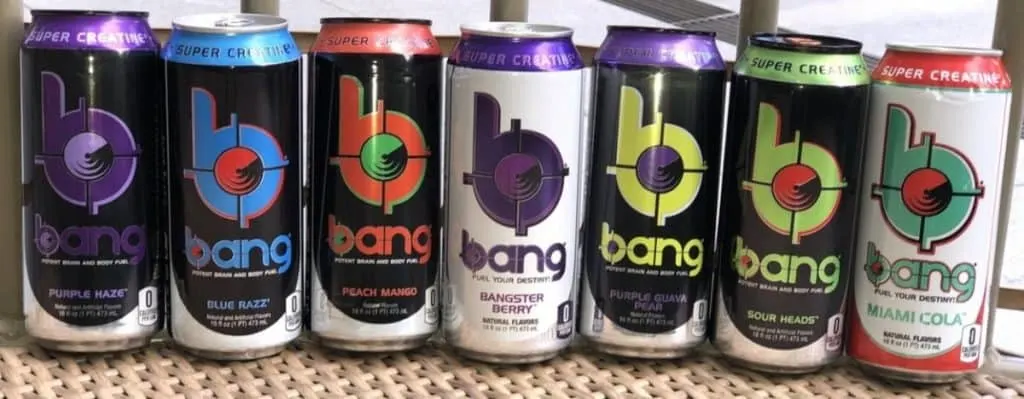
Short answer: While Bang claims to contain 300mg of caffeine in each can, lab test results suggest that it contains a fairly lower amount, although how accurate those tests are is debatable.
For a more detailed discussion, stick around as I elaborate on the caffeine content of Bang Energy and compare it against other energy drink brands, and whether or not you should treat Bang as having 300mg of caffeine.
Let’s start!
Contents
Bang Energy Drink Nutrition Facts
| Per Single 16 fl. oz. | Bang | Monster | Red Bull | Rockstar |
| Energy | 0 calories | 240 calories | 210 calories | 122 calories |
| Fat (Of which saturated) | 0g (0g) | 0g (0g) | 0g (0g) | 0g (0g) |
| Carbohydrates (of which sugars) | 0g (0g) | 60g (55g) | 56g (52g) | 26g (24g) |
| Caffeine | 300mg | 160mg | 151mg | 160mg |
| Sodium | 40mg | 370mg | 210mg | 0.82g |
| Protein | 0g | 2.28g | 0g | 2.0g |
| Calcium | 5mg | – | – | – |
| Magnesium | 5mg | – | – | – |
| Vitamin C | 27mg | – | – | – |
| Vitamin B3 | 5mg | 51.5mg | 43mg | 16mg |
| Vitamin B5 (Pantothenic Acid) | – | – | 5.05mg | – |
| Vitamin B6 | 0.5mg | 10.7mg | 40mg | 1.4mg |
| Vitamin B12 | 1.5μg | 13 µg | 9.6μg | 2.5μg |
What Does A Can Of Bang Energy Drink Contain?
Every 16 fl. oz. can of Bang Energy Drink contains the following:
- Carbonated Water
- Citric Acid Anhydrous
- Natural Flavors
- Phosphoric Acid
- Caffeine Anhydrous
- EAAs (L-leucine, L-isoleucine, L-valine, L-lysine, L-threonine, L-phenylalanine, L-histidine, L-methionine, L-tryptophan)
- Sodium Benzoate
- Potassium Citrate Monohydrate
- Sucralose
- Potassium Phosphate Dibasic
- Potassium Sorbate
- Magnesium Chloride
- Vitamin C
- SUPER CREATINE® (Creatyl-L-Leucine)
- Calcium Chloride
- Calcium Disodium EDTA
- Vitamin B3 (Niacinamide)
- CoQ10 (Coenzyme Q10)
- Vitamin B6 (Pyridoxine Hydrochloride)
- Vitamin B12 (Methylcobalamin)
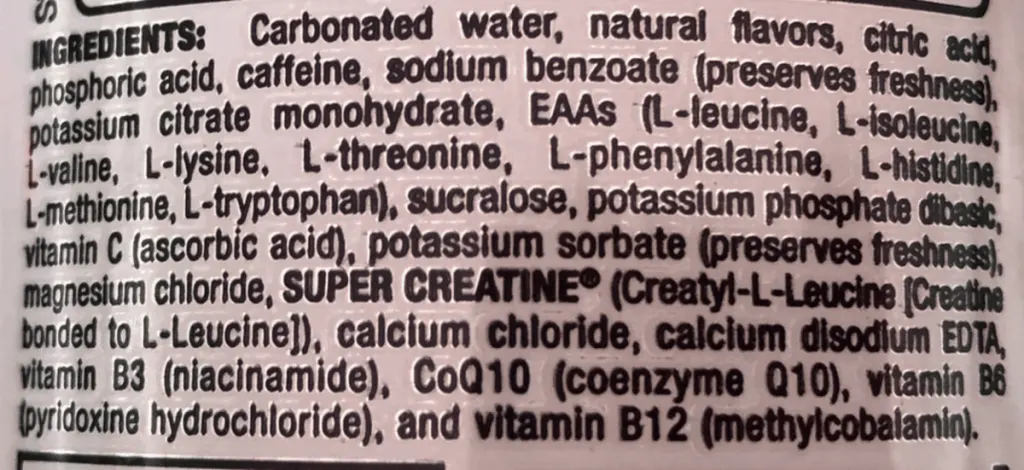
How Much Caffeine Is In Bang?
Based on the label on a can of Bang, there’s supposedly 300mg of caffeine within it.
However, according to these lab test results presented by this writer, the amount of caffeine present in Bang Energy is very different from what was stated and advertised all this time.
Two cans of Bang Energy of different flavors were sent to two different labs for testing. The first lab, Alpha Testing Labs, found that there is only 0.072mg of caffeine per milliliter in a can of Bang (Purple Guava Pear flavor).
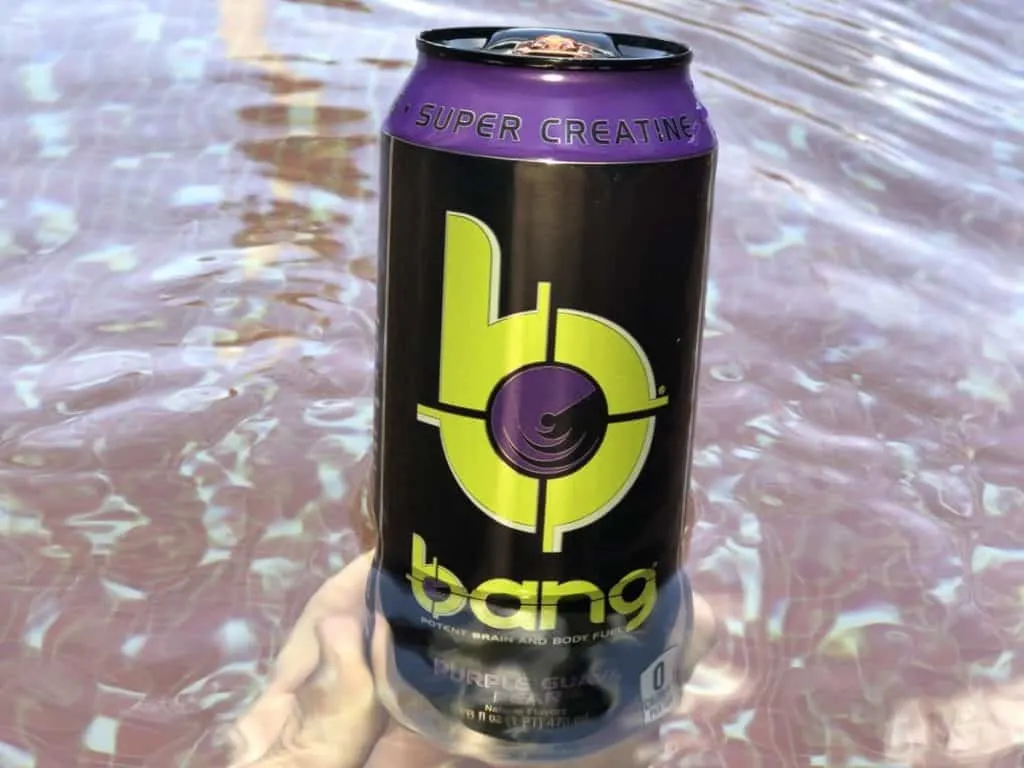
This means that Bang contains 34.06 mg of caffeine per 16 fl. oz., which is much lesser than the 300 mg stated on the back of the can.
Another testing was carried out at Chemical Laboratory (Malaysia) Sdn Bhd and the results differed from the first lab. This lab reported that there is 188 mg of caffeine in a 16 fl. oz. can of Bang (Sour Heads flavor).
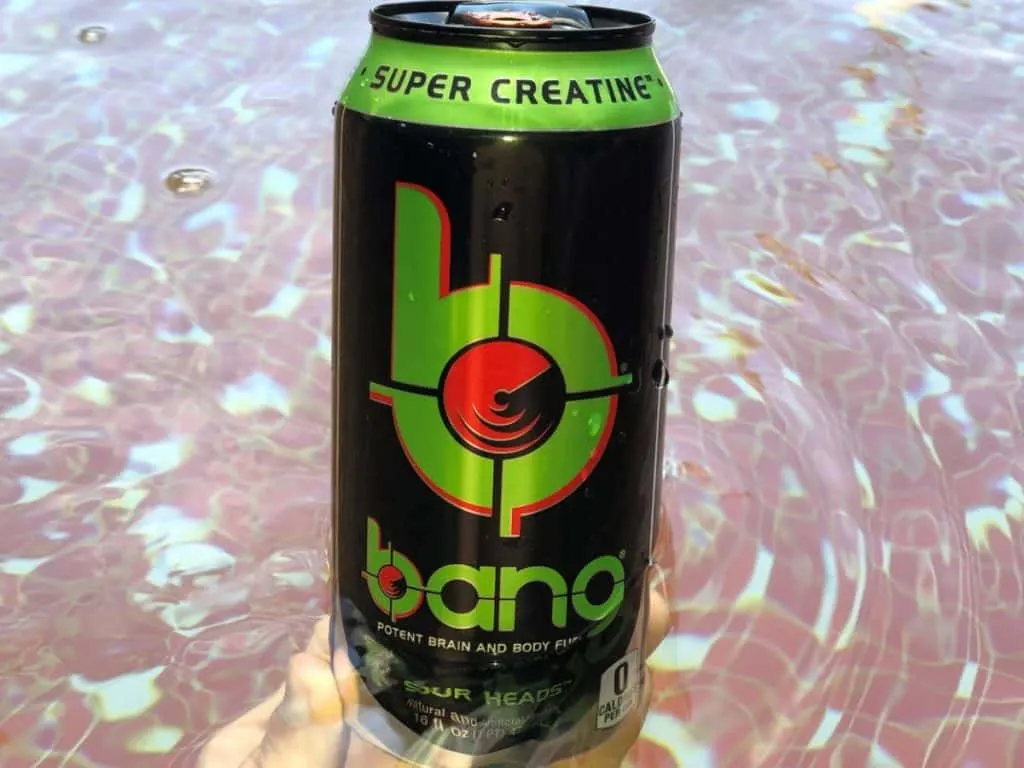
In the same article, the writer mentioned that when he asked one of the laboratories about the inconsistencies of caffeine between the two flavors, the laboratory told him it was probably due to the lack of quality control.
In fact, the right way to do it is to send the same flavor of Bang Energy Drink to different laboratories for testing to get a more accurate result.
All-in-all, while it’s possible that Bang may not have 300mg of caffeine as stated, it’s still best to assume that it does have 300mg of caffeine so you can properly plan out your caffeine consumption for the day.
How much caffeine is in Bang energy drink compared to coffee?
A can of Bang Energy drink contains 160 mg of caffeine, whereas a cup of coffee contains 95 mg of caffeine. A cup of coffee contains 168% more caffeine than a Bang Energy drink.
One possible explanation is that Bang Energy drink is made and sold as an energy drink, whereas coffee is not. Therefore, Bang Energy drinks will have much more caffeine in order to provide a consumer with more energy.
How Long Does The Caffeine In Bang Last?
Caffeine reaches peak levels in your bloodstream within 30 to 60 minutes after ingestion, therefore you’ll most likely feel jittery, more alert and more focused at this time frame.
An article from BBC Science Focus states that the effects of caffeine are noticeable within 10 minutes of consumption.
Typically, for healthy adults, the effects of caffeine will normally last for around 5 hours. However, it does depend on your height, weight and how fast your body metabolises caffeine.
As such, If your caffeine metabolism is slow, the effects of the caffeine within Bang would possibly last longer than 5 hours.
That said, caffeine has a half-life of 5 hours. This means that if you consume 300mg of caffeine from Bang, there will be 150mg left remaining in your system after 5 hours.
Since it takes a considerable amount of time for the caffeine to be completely eliminated from your system, it’s not recommended to have a can of Bang near your bedtime. A 2013 study found that having caffeine 6 hours before bedtime reduces your total sleep time by 1 hour.
Besides, having caffeine regularly at night shortly before you go to sleep could result in insomnia and eventually lead to daytime sleepiness.
For a more detailed discussion on Bang Energy Drink’s lastingness, you can read the article that I’ve written on How Long Does Bang Energy Last, which you’ll definitely find interesting.
Does Bang Have Too Much Caffeine?
According to this review, the intake of less than 400 mg of caffeine daily for healthy adults is completely safe. Hence, consuming a 16 fl. oz can of Bang, which contains 300 mg of caffeine as advertised, is considered acceptable.
Nevertheless. if you have an underlying medical condition, I would advise you to consult your doctor first before consuming that much caffeine.
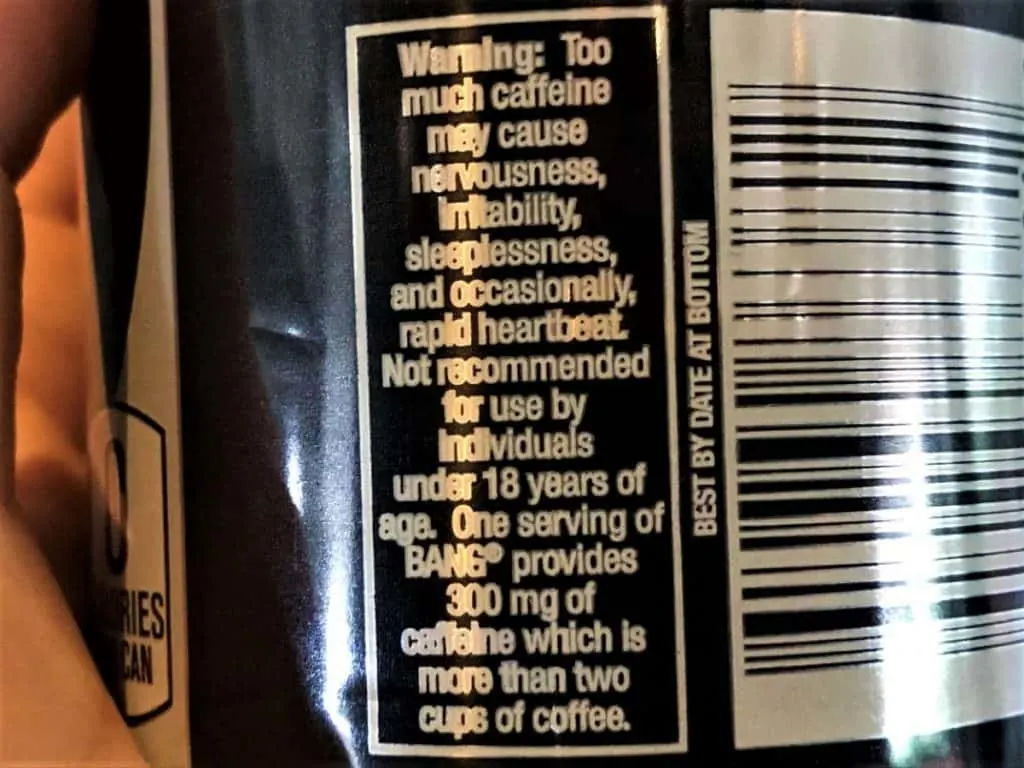
Other than that, you’ll probably feel the effects of that much caffeine in a more pronounced way if you don’t regularly drink caffeine or simply have a slow caffeine metabolism, doubly so when Bang has such a high amount of caffeine.
That said, you can build up a tolerance toward the effects of caffeine with regular consumption. Once your tolerance toward caffeine is high enough, the effects of caffeine won’t affect you negatively compared to before.
But a high caffeine tolerance also means you won’t be able to experience the benefits that caffeine usually gives you in terms of improvements in your physical and mental performance.
If your caffeine tolerance has reached its limits and you can’t feel the usual ‘kick’ from your daily cups of coffee or can of energy drink, you can overcome your tolerance by decreasing your daily caffeine intake or try consuming caffeine less often.
Other than that, it was also mentioned that an intake up to 300 mg of caffeine per day for healthy adult women is safe and isn’t associated with potential miscarriages or developmental side effects.
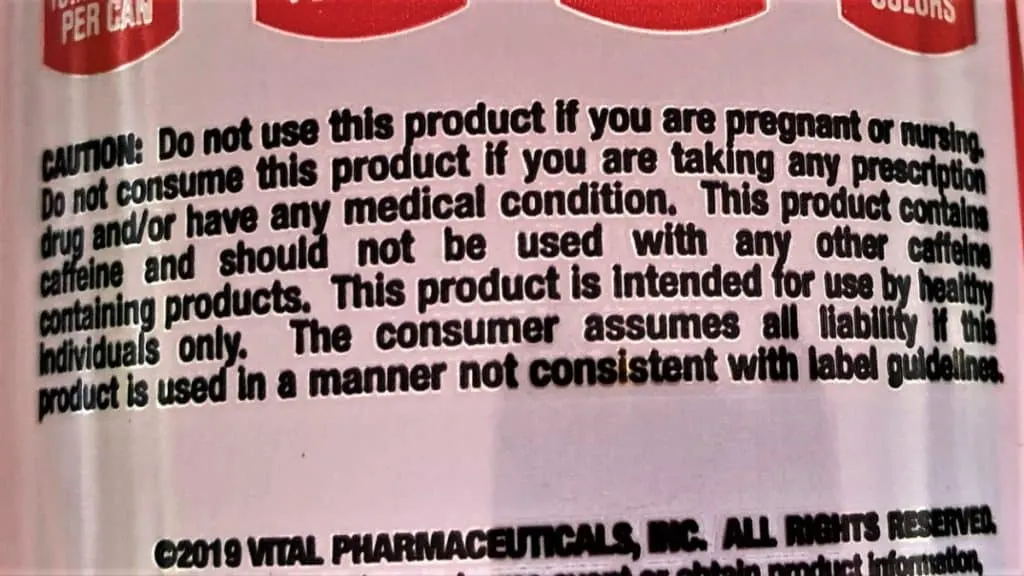
As for kids and adolescents, it isn’t recommended to allow them to have caffeine at a young age. This article details the opinions of several medical experts and the general consensus is that caffeine causes adverse effects that are unnecessary for children.
A regular consumption of caffeine among kids and adolescents could lead to long-term health and developmental problems like anxiety, obesity, increased heart rate and insomnia.
Positive Effects Of Caffeine In Bang
Caffeine provides a long list of health benefits backed up by plenty of research. One of the most well-known benefits of caffeine is reducing the symptoms of fatigue and enhancing alertness and focus.
A 2017 study involving seven participants in a high-intensity cycling exercise reported that time to exhaustion improved by 12% after ingestion of caffeine.
Caffeine can help enhance physical performance too. A study performed on 16 elite badminton players found that the consumption of a caffeine-containing energy drink increased their jump performance and activity patterns during their matches.
Another study reported that muscular endurance increased after the ingestion of caffeine.
Thus, this means that Bang would make a great pre-workout beverage for your exercise routine.
Aside from exercise performance, caffeine also helps improve cognitive functions. A 2016 study reported that low to moderate doses of caffeine increased cognitive performance in aspects like attention, alertness, vigilance and reaction time.
Caffeine can also aid in weight control, though it requires exercise and a healthy diet. The consumption of caffeine stimulates the breakdown of fatty acids into your bloodstream due to the increase in adrenaline.
Plus, caffeine also increases your metabolic rate, which would make it easier for you to lose weight.
But, of course, this has to be accompanied by physical exercises as well. You won’t be losing any fat just by drinking caffeine unless you’re burning more calories than the amount you consume through your diet.
Drinking caffeine as part of your weight-loss plan isn’t effective as you can build up a tolerance to caffeine over time. So, if you want to shave off those extra pounds, maintain a regular workout schedule with a balanced diet instead of relying on stimulants like caffeine.
You should also read the article that I’ve written – How Healthy is Bang Energy Drink? to decide if the positive effects of caffeine alone shall determine your choice to drink Bang.
Bang Caffeine Side Effects
Due to Bang’s high caffeine content, side effects such as insomnia, headaches and restlessness may be common, especially if you’re not used to such a large amount of caffeine.
Caffeine may have lots of benefits, but it also comes with unpleasant side effects.
As you know, the recommended daily caffeine intake by the FDA is 400mg for healthy adults. Too much caffeine would lead to side effects like:
- Insomnia
- Headaches
- Dizziness
- Restlessness and shakiness
- Anxiety
- Dehydration
Long-term effects of the use of caffeine would eventually cause the development of health issues like:
- Digestive issues
- Muscle breakdown
- Addiction
- Rapid heart rate
- High blood pressure
- Fatigue
- Frequent urination and urgency
Although research may have confirmed that consuming 400mg of caffeine per day for healthy adults wouldn’t have any detrimental effects, you should probably stick to a lower amount of caffeine per day for general health reasons.
In brief, moderate your daily intake of caffeine and limit the number of caffeinated beverages you have in a day, especially if they’re energy drinks with a high caffeine content like Bang.
As such, it’s best to only stick with one can of Bang per day, and be sure not to have any other caffeinated beverages, such as tea, coffee, or soda, if you do plan on having a Bang.
Can I drink 2 bangs in a day?
Bang Energy drinks are high in caffeine and other ingredients that, when taken in large quantities, can be harmful. As a result, it is not recommended to consume more than one Bang per day. If you are a healthy adult, one can of Bang Energy drink per day not harm you.
However, a healthy diet rich in nutrients is still required. Furthermore, lactating and pregnant women, as well as immunocompromised people, minors, and children, should avoid drinking Bang energy drinks.
How Do You Deal With Caffeine Withdrawals?
Maybe your caffeine tolerance has reached sky-high and you aren’t getting that awesome kick from your favourite pick-me-up anymore. Or, caffeine is giving you a hard time health-wise and you need to cut caffeine out of your diet for your own good.
It may feel like going on a diet and quitting your favorite foods while replacing them with healthier options. Nonetheless, quitting caffeine is actually a challenge on its own, especially if you stop drinking it abruptly when you regularly consume caffeine.
You’ll start experiencing a few nasty symptoms of a caffeine withdrawal:
- Fatigue
- Headache
- Changes in mood
- Constipation
- Difficulty concentrating
Symptoms will usually appear around after 12 to 24 hours of quitting caffeine and can last for as long as 9 days. The severity and duration of caffeine withdrawals can vary from one person to another.
What you can do to avoid or reduce the symptoms of a caffeine withdrawal is to not quit caffeine cold turkey and instead slowly decrease your caffeine intake.
A finding from 2019 found that the best method you can relieve caffeine withdrawal symptoms is by consuming more caffeine. Sounds counterproductive, but slowly reducing intake is a bit better than quitting outright.
This article suggests that you should reduce your caffeine intake by 10% every two weeks. This would take several months for you to overcome your caffeine dependency, but at least you won’t have to deal with any more headaches.
If you want to know more about how to deal with caffeine withdrawals, check out this video:
While you’re cutting back, you could replace your caffeinated foods and drinks with alternatives like water, herbal tea and decaf coffee. In Bang’s case, it also has a caffeine-free energy drink line, which is VPX Bang.
Bang’s Caffeine Content Vs Other Energy Drinks
A 16 fl.oz can of Bang is advertised as having 300mg of caffeine, which is a lot higher than a regular 8.4 fl.oz of Red Bull (80mg) or 16 fl.oz of Monster (160mg).
| Energy Drink Brand (per 16 fl.oz) | Bang | Red Bull | Monster |
| Caffeine Content | 300mg | 151mg | 160mg |
From looking at the table above, it’s obvious that Bang tops the other popular energy drink brands in terms of caffeine content.
But first let’s look at the pros and cons of having a lot of caffeine in a single can. Compared to other conventional brands, Bang Energy will give you a stronger and longer-lasting boost. It’s great when you need to concentrate on a tedious task for a long time or if you’re rigorously training the whole day.
Notwithstanding, Bang’s high caffeine content is the reason it isn’t recommended for everyone. If you’re sensitive to the effects of caffeine or have a medical condition, Bang is off the list for you.
The good news is that you can choose from brands like Monster. A regular 8.4 fl. oz. can of Red Bull only has 80 mg of caffeine, which is perfect if your caffeine tolerance is pretty low.
Final Thoughts
Bang Energy Drink has built up a reputation of its own over the years. Like other energy drinks, it has distinct aspects and benefits that help it to stand out and appeal to personal preferences.
Bang’s high caffeine content is certainly one of it’s highest selling points, giving you a pretty good boost if you can handle it.
That being said, it’s definitely not for everyone, especially if you’re new to energy drinks or just have a low overall caffeine tolerance.
All-in-all, it’s really up to you if you want Bang as your pick-me-up even if it has a really high 300mg of caffeine in each can. Just remember that moderation is key, and you’re all set for tackling Bang Energy Drinks.
Check out the visual story version of this article here.
Other Articles
For a more thorough analysis on Bang Energy Drinks and comparison of Bang with other energy drinks, you can refer to the articles that I’ve written:
